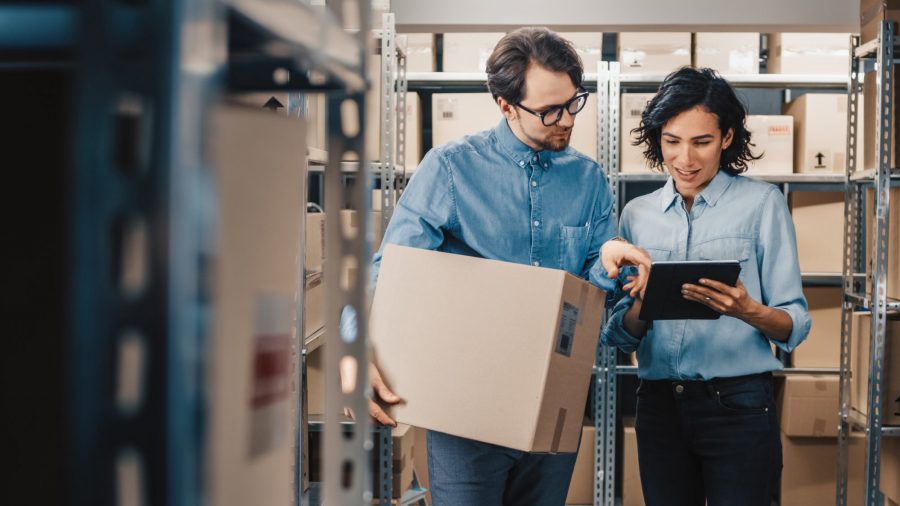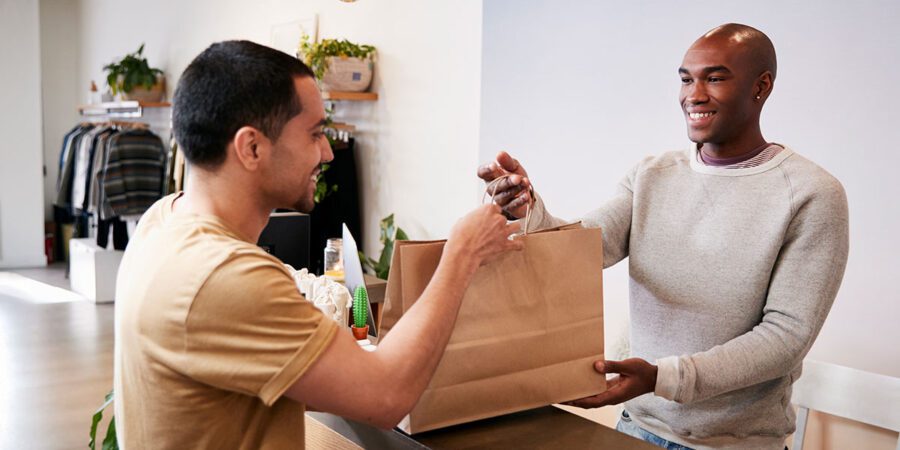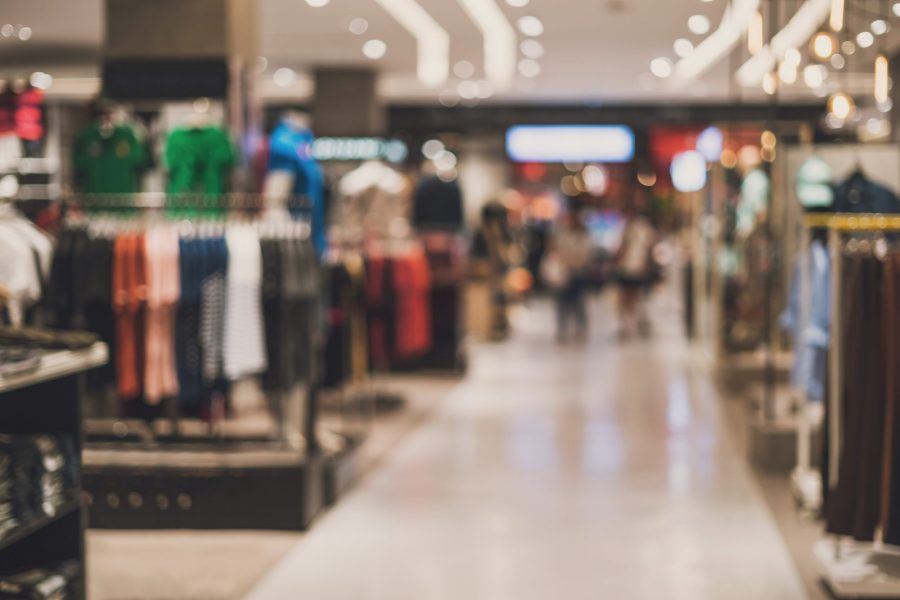
Retail
The Rise in Fulfilment-from-Store for Retailers
Written by: Parcel Pending
6 Min Read
Published: September 23, 2022
Updated: January 29, 2025
When shops were shuttered and warehouse operations were squeezed in the early stages of the pandemic many retailers ramped up efforts to ship online orders from stores.
It made sense to use these pools of stock across the UK to alleviate the pressure on their online distribution networks which wobbled as e-commerce demand hit record levels. Forward-thinking omnichannel retailers, where digital and physical operations are neatly combined, already had systems in place to facilitate this, but other less connected businesses were forced to adopt ad-hoc processes to support the fulfilment shift. Thankfully, now, Covid-related store closures appear a thing of the past, but where has the dust settled? It appears ship-from-store is a permanent feature for some, while others – like Morrisons – are not so sure, reducing their ecom-from-store-fulfilment ops as online demand slowed down again. Against this backdrop, we’ve picked out five retailers that have placed it at the heart of their e-commerce operations and explain how it is working for them.
B&Q
Stores “dual up as fulfilment centres”, explained B&Q’s Chris Bargate in May, during a Retail Week Stores Summit event panel discussion which also involved Parcel Pending by Quadient Retail Director, Candice Ohandjanian. Bargate was talking about the DIY retail chain’s pandemic acceleration to add its stores to its e-commerce distribution network – the move has been a major part of the company’s ongoing digital transformation work. He said the stronger combination of digital and physical at B&Q is “fuelling” the business’s progress, right now. In March, B&Q’s parent company Kingfisher said moving to store-based picking and fulfilment has been “critical to efficiently meeting significant online volumes”, with nine in ten e-commerce orders now picked in store. Speed and cost of home delivery improvements were noted as a result of the ship-from-store model, and the retail group said faster fulfilment is a key competitive advantage for its retail banners over their online pure-play rivals.
Matalan
Until recently, clothing and homeware retailer Matalan fulfilled online orders from one central distribution centre, but it opened up stores to its e-commerce network in the pandemic as shops shut and online demand escalated. Its circa 200 stores across the UK are now a permanent part of the online distribution network and considered to be a central cog in the retailer’s ambitious digital transformation roadmap. Matalan said earlier this year that ship-from-store was a key element of the first phase of its transformation – and alongside investment in automation it has helped double the retailer’s capacity in terms of meeting online demand for its products.
Waitrose
In August, in another example of how retailers continue to shake up their online operations to meet shopper demands, Waitrose expanded its partnership with rapid food delivery service Deliveroo. Some 2,000 products from the supermarket chain are available via the service, with customers able to order these items on Deliveroo’s app, prompting in-store preparation of the goods which are then collected by Deliveroo drivers. And the retailer’s store network is already utilised for general e-commerce orders, too. Waitrose wants to double the size of its own e-commerce business over a five-year period from 2020 levels and that expansion is supported by its decision to add online picking and delivery capability to circa 80% of its stores.
Pets at Home
Pets at Home is using its store network to enable same-day delivery, which in several UK regions includes two-hour delivery to people’s homes. Since launching one-hour click & collect in the pandemic, one-fifth of all Pets at Home online orders are now fulfilled via this particular service which highlights the significant demand for it. It was the success of the click & collect service that provided the foundations for the company to start a ship-from-store operation for home delivery. In its preliminary results announcement for 2021-22, published in May, Pets at Home said it was expanding its ship-from-store offer because it reduces the variable costs associated with centralised fulfilment and delivery, and gives more choice to customers.
Harvey Nichols
As Harvey Nichols’ store director, Iain Mackenzie, told the Retail Week Store Summit audience, the luxury department store business has offered in-store fulfilment for years. The customer should not fit the retailer – it is vice versa, he explained to delegates when describing the importance of keeping up with modern shopper behaviours. Much of the work retailers are doing to embed omnichannel operations is creating a “more meaningful experience” for consumers, he added.
The ship-from-store toolkit
There are many reasons from retailers why ship from store works for them. Based on these retailers, we can summarise five top benefits as:
- Gives customers more choice
- Provides more flexibility for the retailer
- Can speed up delivery to the customer
- Can help a retailer grow its digital operations faster
- Provides a meaningful experience to the customer
However, the final leg of any fulfilment strategy potentially needs to be the most considered.
For many retailers, including some mentioned above, the traditional method to ‘collect from store’ involves a customer queuing up at a till, a dedicated click-and-collect counter, or by finding a member of staff on the shop floor to go and collect their order for them.
These lengthy processes cost retailers and customers time and money. For the retailer, their staff time is consumed by toing and froing between the shop floor and a stock room, collecting, processing, and distributing orders. For the customer who just wants to get in, collect their order and back home again, the longer they have to wait, the greater the negative experience it becomes. This is where smart retail lockers can help to streamline the process.
How Smart Retail Lockers Enhance a Fulfil-from-Store Strategy
By fulfilling orders from store directly into self-service retail smart lockers instead of to a click-and-collect counter, you allow your customers who are collecting orders to self-serve when they enter the store. This removes the need for staff to be involved in the collection process, and so they are available to support the needs of other customers who may be likely to spend money.
For retailers and distributors who sell oversize goods, or large orders of items (for example a hardware store), Parcel Pending by Quadient Oversized Lockers offer an automated, convenient fulfilment option. This allows retailers and distributors to deliver a more streamlined pick-up and returns experience to customers, as well as realise more store efficiency and more revenue.
“Collection lockers provide a 7-second service to click-and-collect shoppers, who don’t need to wait around in a queue anymore. Alongside that, staff can be deployed to serve other shoppers who need advice and assistance” says Candice Ohandjanian – Quadient Retail Director.
Additionally, lockers can be placed outside the store to enable customers to collect up to 24 hours a day, providing even more convenience.
At Parcel Pending by Quadient, we help retailers realise the benefits of using their stores to support e-commerce by fulfilling orders to smart retail lockers. Parcel Pending by Quadient is already working with the likes of Decathlon, putting lockers in place for click & collect orders. If you are considering pivoting your strategy to include fulfilment-from-store, we’d love to chat about how we can enhance that journey.
This is a fertile space for innovation in retail right now, and we have some fantastic options for you to consider including indoor and outdoor lockers, lockers for low volumes right up to oversize lockers which can fit up to 90% of in-store products.
Contact us today to speak to an expert.



